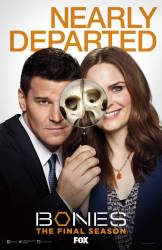Revealing mistake: When Hodgins is explaining about decomp gasses, you can see in one shot Angela is mouthing his lines. (00:18:10)

Bones (2005)
1 revealing mistake in A Boy in a Tree - chronological order
The Parts in the Sum of the Whole - S5-E16
Continuity mistake: In this episode, Booth and Bones are telling Sweets about their "real first case" together - the case where they actually met for the first time. During this episode, Booth, Bones, and Angela take some evidence to Caroline, and Booth introduces them both (most importantly Brennan) to Caroline. However, in season 1, episode 19, "The Man in the Morgue", (which would have taken place after this initial first meeting) when Brennan is accused of murder in New Orleans, Booth has Caroline fly to NOLA to be Brennan's lawyer, and he introduces the two of them. If they had already been introduced during the first case Booth and Brennan worked on together, they would not have needed to be introduced here; they would have already known one another.
Dr. Temperance Brennan: I've never gotten a B and I never will.
Seeley Booth: That's my girl.

Trivia: At around 5 mins 11 seconds into the episode, Vincent Nigel-Murrey and Dr. Saroyan are discussing the bones on the forensic platform. In the background of a shot of Vincent, the x-ray on the screen is of Homer Simpson's head in the middle of the screen, instead of a real human skull.
Question: Between season 2 and season 6 we periodically meet a serial killer called The Grave Digger who's actual name is Heather Taffet. Having watched the complete series a while ago, one thing was never made clear (or I might have missed it) How did Taffet physically bury the containers her victims were in? The twins were buried in a park in a submerged beer vat that is stated as being 6ft high. Bones and Hodgins are buried around 4ft underground in a car. How does she manage to bury them without being seen or interrupted?
Join the mailing list
Separate from membership, this is to get updates about mistakes in recent releases. Addresses are not passed on to any third party, and are used solely for direct communication from this site. You can unsubscribe at any time.
Check out the mistake & trivia books, on Kindle and in paperback.




Answer: Answering my own question here but, having contacted various people involved in the production of Bones including Kathy Reichs, Hart Hanson, Eric Milligan, and Deirdre Lovegood who portrayed Taffet onscreen I finally have the answer. No-one know how she did it due to her constantly working alone. And she never revealed this information before her death.
Ssiscool ★